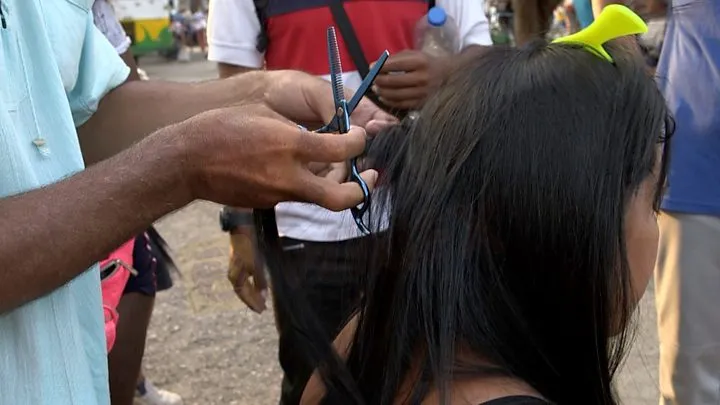简体中文
繁體中文
English
Pусский
日本語
ภาษาไทย
Tiếng Việt
Bahasa Indonesia
Español
हिन्दी
Filippiiniläinen
Français
Deutsch
Português
Türkçe
한국어
العربية
US hits 'corrupt' Venezuela oil firm PDVSA with sanctions
Abstract:Media playback is unsupported on your device Media captionDesperate Venezuelan women are selling t

Media playback is unsupported on your device
Media captionDesperate Venezuelan women are selling their hair at the border
The US has imposed sanctions on Venezuela's state-owned oil firm PDVSA and urged the country's military to accept a peaceful transfer of power.
National Security Adviser John Bolton said President Nicolás Maduro and his allies could “no longer loot the assets of the Venezuelan people”.
Efforts by the opposition to unseat Mr Maduro have increased in recent days.
The US and more than 20 countries have recognised opposition leader Juan Guaidó as interim president.
Treasury Secretary Steven Mnuchin said the proceeds of the purchase of Venezuelan oil would now be withheld from Mr Maduro's government, but the company could avoid sanctions by recognising Mr Guaidó.
Venezuela is heavily reliant on the US for its oil revenue - sending 41% of its oil exports there - while it remains in the top four crude oil suppliers to the US.
Why Venezuela's military is backing Maduro
Venezuela crisis - in seven chart
What's behind Venezuela's political crisis?
In other developments:
Mr Guaidó says he is ordering Venezuela's Congress to name new heads of the PDVSA and Citgo, as he aims to take control of the country's asset
The government has devalued its currency, the bolivar, by almost 35% to align it with the black market exchange rate
What is the US calling for?
Mr Bolton and Mr Mnuchin said the sanctions were intended to prevent Mr Maduro's government from taking funds from the state oil company.
“We have continued to expose the corruption of Maduro and his cronies and today's action ensures they can no longer loot the assets of the Venezuelan people,” Mr Bolton said.
Image copyrightEPAImage caption Mr Maduro is accused of human rights abuses and rigging electio
The US action blocks all PDVSA property and interests subject to US jurisdiction, and prohibits US citizens from engaging in transactions with them.
But Mr Mnuchin said US-based subsidiary Citgo could continue operations if its earnings were deposited in a blocked account in the US.
Mr Bolton also urged Venezuela's military to “accept the peaceful, democratic and constitutional transfer of power”.
Asked whether US President Donald Trump was considering military involvement in Venezuela, Mr Bolton said: The president has made it clear that all options are on the table."
Meanwhile one observer spotted a handwritten message on the national security adviser's notepad, which he suggested might be a serious infringement of operational security.
It was not clear what the message “5,000 troops to Colombia” means.
Skip Twitter post by @RaoKomar747
So this notepad that National Security Advisor John Bolton was holding today at the White House briefing on Venezuela says:
Afghanistan -> Welcome the Talks. 5,000 troops to Colombia."
If confirmed this would be a pretty terrible OPSEC breach.https://t.co/KS0Issfvps pic.twitter.com/IOrSprG567
— Rao Komar (@RaoKomar747) January 28, 2019
Report
End of Twitter post by @RaoKomar747
Who supports whom?
Russia, China, Mexico and Turkey have publicly backed Mr Maduro.
At a UN Security Council meeting on Saturday, Russia accused Washington of plotting a coup.

Media playback is unsupported on your device
Media captionWho's really in charge in Venezuela? The BBC's Paul Adams explai
However, more than a dozen Latin American countries and Canada have backed Mr Guaidó as president.
And on Saturday, several European countries including Spain, Germany, France and the UK said they would recognise Mr Guaidó as president if elections were not called within eight days.
Why is Maduro so unpopular?
Venezuela is in economic crisis - hyperinflation and shortages of basic essentials have hit its population hard and caused millions to flee.

Media playback is unsupported on your device
Media captionThousands more leave Venezuela amid new crisi
Mr Maduro has faced internal opposition and ongoing international criticism for his human rights record and handling of the economy.
How Venezuelans stave off hunger
Fury at Maduro's Salt Bae feast
He was re-elected to a second term last year - but the elections were controversial, with many opposition candidates barred from running or jailed.
Supreme Court judge Christian Zerpa fled to the US in January, telling journalists the election “was not free and competitive”.
Are you in Venezuela? What has life been like in the country? Tell us your story by emailing haveyoursay@bbc.co.uk
Please include a contact number if you are willing to speak to a BBC journalist. You can also contact us in the following ways:
WhatsApp: +44 7555 173285
Send pictures/video to yourpics@bbc.co.uk
Or Upload your pictures/video here
Tweet: @BBC_HaveYourSay
Text an SMS or MMS to+44 7624 800 100 (international)
Please read our terms & conditions and privacy policy
Disclaimer:
The views in this article only represent the author's personal views, and do not constitute investment advice on this platform. This platform does not guarantee the accuracy, completeness and timeliness of the information in the article, and will not be liable for any loss caused by the use of or reliance on the information in the article.
WikiFX Broker
Latest News
CySEC Warns Against Unauthorized Investment Firms in Cyprus
Why Even the Highly Educated Fall Victim to Investment Scams?
Warning Against Globalmarketsbull & Cryptclubmarket
Dukascopy Bank Expands Trading Account Base Currencies
UK Sets Stage for Stablecoin Regulation and Staking Exemption
Axi Bids AUD 52M to Acquire Low-Cost Broker SelfWealth, Outbidding Competitor Bell Financial
Crypto Influencer's Body Found Months After Kidnapping
STARTRADER Issues Alerts on Fake Sites and Unauthorized Apps
Italy’s CONSOB Blocks Seven Unregistered Financial Websites
Bitfinex Hacker Ilya Lichtenstein Sentenced to 5 Years in Prison
Currency Calculator


